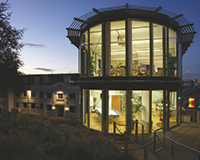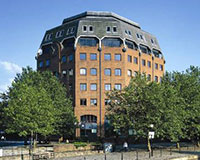Watch out for fob watches, beards and pushbikes, and the tweed-meets-Converse vibe.
Watch out Bristol – because here come the hipsters.
Until now the hipster – the most florid of the techie sub-species – has rarely been found outside its native habitats of Shoreditch, Clerkenwell and Hoxton. Here they feed on apps and code and other nourishing digital worms. In fact, no breeding colony has yet been established west of the EC1 postcode area, until now – because Bristol could be the one place where the hipster finally feels at home.
Somo Global, a tech firm with a trans-Atlantic mobile marketing flavour, is settling into Bristol nicely. According to chief business officer James Turner, expanding into Bristol was a natural next step for the group, whose work includes an iPad app for ordering pizzas, and a client list that includes diamond giant De Beers.
The firm has taken 4,000 sq ft at Scottish Widows’ One Redcliff Street, a 140,000 sq ft refurbished 1960s office block with clean, unfussy 10,000 sq ft floors. It is about as far from funky hipster-style office space as it is possible to imagine.
Turner says: “When we first looked in early 2014 there was the enterprise zone option – places like the Engine Shed. But it was filling up fast even then. There was some space in the wharves, and some tech occupiers want funky space, but functional suits us perfectly. It’s not an attractive building but it is furnished and comfortable and we’ve made it our own.”
Today Somo’s Bristol team is 40-strong – a large slice of its 200-person workforce – and it is likely to grow. “We will be recruiting in Bristol, rather than in London,” says Turner. “We will expand the engineering side of the business in Bristol, rather than in the capital.”
According to Matthew Cross, head of inward investment at Invest Bristol & Bath, Somo is typical of the latest relocations. That is because property occupies a relatively low spot on its decision-making check list. To tech businesses such as Somo, a strong and talented local labour market is what matters – along with a sense of connection (Somo’s chief executive and founder, Nick Hynes, has an MBA from the nearby University of Bath).
The Invest Bristol & Bath team has eased tech occupiers into around 100,000 sq ft of the city’s office floorspace in the past two years, and hopes for another 60,000 sq ft in the short term. “We’ve got other conversations underway,” says Cross.
“Investment decisions like this were once property-led, but now they are skills-led. Somo and businesses like it come here for the talent, not because we have nice offices ready for them. They decide they want to be here, then they start to look for space, in that order,” he says.
Fewer nests
Property may not be a priority, but it could become a problem. Rents are not the issue – at around £20 per sq ft they are less than half what hipster tenants might pay in Shoreditch. The problem, rather, is supply. Bristol’s existing tech-focused properties, including Paintworks, Temple Studios, Verve’s Brew House and the Engine Shed, are now full or nearly so. If incomers do not fancy refurbished 1960s and 1970s blocks, they may struggle to find a roost.
Cross says Bristol mayor George Ferguson, together with the local enterprise partnership and Invest Bristol & Bath, are painfully aware of the problem and are already exploring a number of solutions.
He says: “To be brutally honest, yes, we have some supply issues. The Temple Quarter enterprise zone is a long-term project to address them, but in the meantime we can show there is demand, and we’re conscious of the need for the right properties at the right price point. We are exploring routes to deliver in the private sector quickly – and if the private sector can’t deliver, then the public sector is ready to fill the gap, although how we do that remains to be seen, and I’m choosing my words carefully.”
Grant funding of £4m has already been obtained to help deliver an Engine Shed 2-type development of perhaps 25,000 sq ft. But more will be needed. Bilfinger GVA is working on a feasibility study, says director Richard Kidd, who adds: “There might be a funding gap that requires public sector support because otherwise we’d be looking at rents in the late £20s per sq ft. Maybe the city council could take the lease, as we’ve seen in other cities, although I’m not sure Bristol would do that.”
The best private sector hope is that a handful of city office blocks until now slated for residential conversion are, instead, refurbished for office use (see offices feature, page 92). Agents fight shy of saying exactly who, exactly where and exactly what, amid talk of off-market deals, but landlords such as Royal London and Derwent are being mentioned, perhaps optimistically.
Andy Heath, a director at DTZ, sheds a little light when he says: “Older buildings are attractive to developers now the office market has come back, and vacant office blocks are suddenly no longer so suitable for conversion to student housing or residential.”
Jeremy Richards, regional lead director at JLL, says that landlords have an opportunity if they are tech-savvy enough to grab it.
“Developers have to look at refurbishments to suit tech occupiers – office blocks stripped back to an industrial feel. I know landlords are thinking about this. There’s around 150,000 sq ft of older office space now subject to appraisals and would command rents in the early £20 per sq ft bracket.”
So get your pushbikes out, and wind up your fob watches. The hipsters really are on their way.
Broad tech appeal
Just Eat, the online takeaway ordering service, has signed a 10-year lease for the 10,057 sq ft second floor at Broad Quay House, Prince Street. The new office space will house the company’s technology innovation hub, with Just Eat being attracted to Bristol’s strong demographic for this area of operations. Meanwhile, Cray UK has signed a five-year lease for the 8,000 sq ft ground floor, following a deal late last year with the UK Met Office.
Amanda Cowking, portfolio manager at Standard Life Investments, landlord at Broad Quay, says: “Bristol is one of the top six regional centres in the UK and technology companies continue to see it as a great location. Standard Life Investments recently leased 10,000 sq ft at Broad Quay House to Just Eat. The fact that a market-leading, post-IPO technology company like Just Eat chooses Bristol demonstrates the city’s strong reputation for technology.”
Jones Lang LaSalle and DTZ advised Standard Life Investments, Martin Levy Commercial advised Cray and Bilfinger GVA advised Just Eat.













